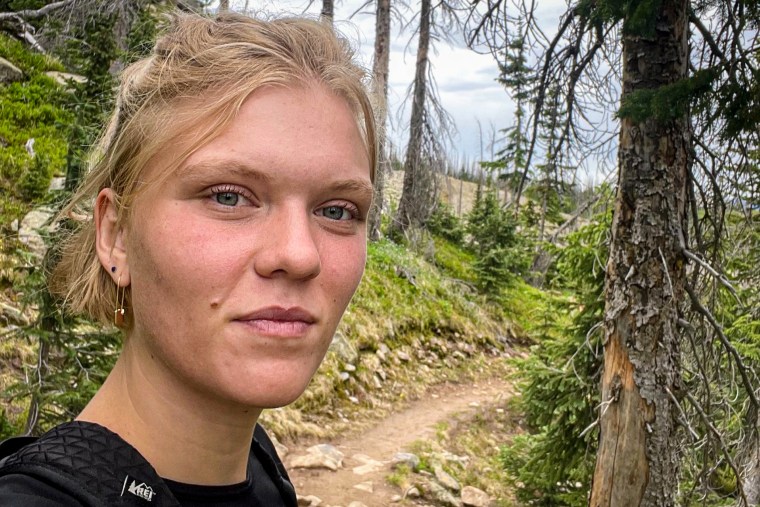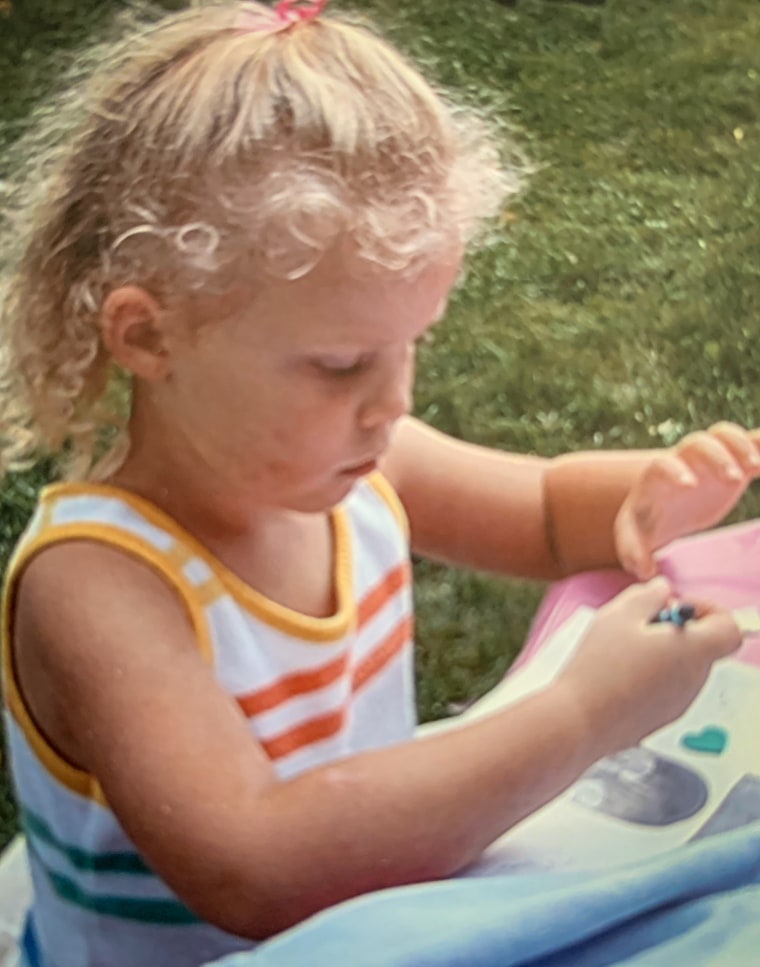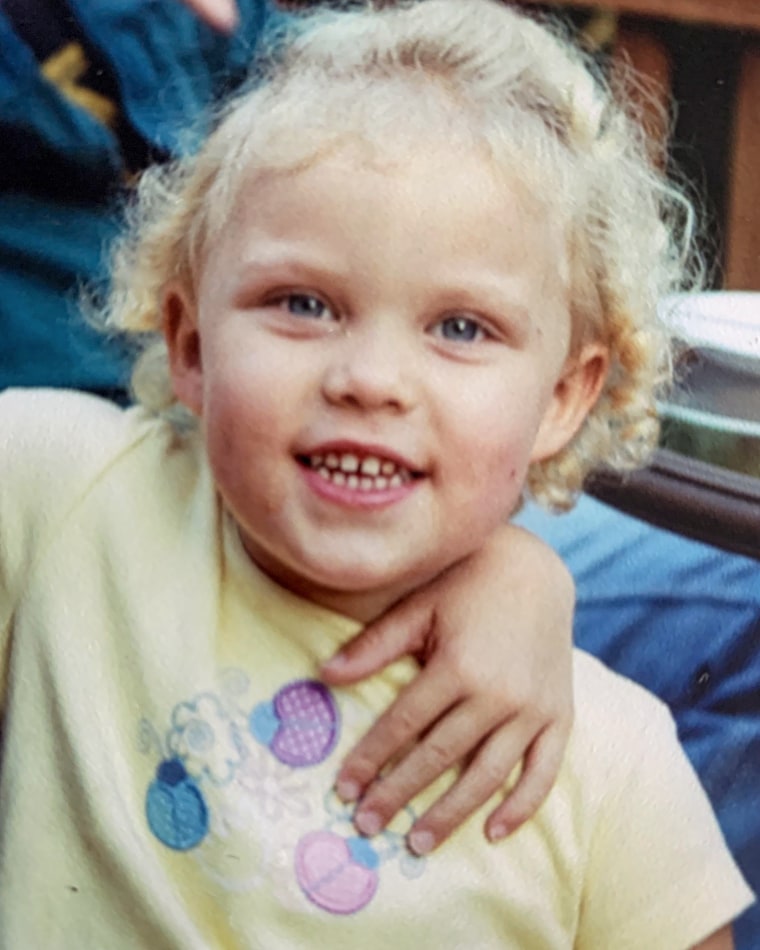As a young girl, Marian Ippel was consumed by recurring thoughts and dreams of herself and other children being raped. Her yearly physical provoked fear.
It wasn’t until 2020, after months of therapy to address her anxiety and depression, that the inexplicable feeling of dread began to click: Then 17, she recovered memories, she said, of sexual assault by fellow church members abusing her when she was around 3 and 4 years old.
Now 21, Ippel is accusing her Grand Rapids, Michigan, church of creating a culture that fostered alleged abuse in a lawsuit that is not typical: Her complaint, filed Monday in Kent County Circuit Court, claims harm was done to her at such a young age, while hinging on memories that she says she retrieved later in life.
“Even though it happened almost 20 years ago, it has had a devastating effect on me since then,” Ippel told NBC News, “and that is a big reason why I feel so confident stating the facts and the extensive therapy I’ve gone through.”

Her lawsuit names as defendants the Grace Christian Reformed Church of Grand Rapids and affiliates, including the Christian Reformed Church in North America, a Protestant Calvinist Christian denomination also based in Grand Rapids. The suit says the church was responsible for preventing abuse and accuses it of creating an environment that Ippel believes gave a deacon “unfettered access to one-on-one meetings with young children including Plaintiff, who trusted him and Defendants to provide a safe environment for their education and counseling.”
Ippel is seeking a jury trial, damages and court orders that would require the church to investigate others who may have been harmed by her alleged abusers, overhaul its practices and policies, and secure “proper training” for those in positions of authority and who are responsible for minors and other vulnerable people.
“Churches are places where people are supposed to be safe,” she said.
The Grace Christian Reformed Church did not immediately respond to requests for comment. The Christian Reformed Church in North America did not comment specifically about Ippel’s allegations but said it has “developed strict policies and procedures” meant to keep children safe and encourage prompt reporting of abuse.
Lynne Cadigan, an Arizona attorney who has represented victims in Mormon and Catholic church-related sex abuse lawsuits, said recovered memory cases can test the bounds of such litigation because they require judges and juries to scrutinize an accuser’s credibility.
While Ippel is the only person to have come forward publicly against those accused in her suit, her lawyer believes that there are people who have had similar experiences or can help corroborate her account.
“Recovered memory cases are difficult because you may need corroborating evidence, particularly when a child is very young,” Cadigan, who is not associated with Ippel’s case, said. “It requires a lot of investigation into the perpetrator, finding out if there were other victims, other witness statements and could the perpetrator have had the opportunity to do this.”
Abuse allegations
Ippel says the repression of traumatic memories from her childhood was not a conscious decision. She grew up excelling in school, surrounded by a loving family.
“I was an example of someone you thought was a very good kid,” she said.
But inside, the anxiety was overwhelming, according to her lawsuit. She told no one that she felt suicidal. When she was 16, she said, she began counseling. It was through psychotherapy, including an approach known as “Lifespan Integration” therapy, which involves a person going through a timeline of their memories to heal from past trauma, that she says she pieced together what happened.

In her complaint, she alleges how a deacon led her by the hand to the church basement after a Sunday children’s worship service in 2006. She wore a pink, green and white summer dress, according to the lawsuit. The deacon allegedly sexually assaulted her before having her return upstairs alone, where her parents were distracted.
According to the suit, Ippel’s parents gave her a cookie after church. “Around this same time, Marian’s mother remembers finding blood in Marian’s underwear,” the suit says, “but could not fathom why this was so.”
The deacon named in the complaint died in 2010 at age 66.
The Christian Reformed Church in North America said it was unaware of any other complaints against the deacon, but said it investigates claims when people come forward.
“Survivors will forever be in our prayers,” the church said in a statement. “We commend their courage to come forward, even when abuse may have occurred many years ago, and we are investigating this further. The Christian Reformed Church in North America desires for all our congregations and programs to provide a safe and welcoming environment for children and all members of the community.”
But Ippel says the incident with the deacon wasn’t the only abuse she recalled. When she was 4, during a church mission trip with her family in Guinea, the 12-year-old son of another missionary family began sexually abusing her, according to the suit. The boy, identified by the initials M.H., had himself allegedly been abused by another child in the church years earlier, and that had previously been reported to mission trip organizers, the suit also says.
In 2020, when Ippel says therapy helped recover her memories, she spoke with her parents and said they reported the alleged abuse by M.H. to his parents, the mission trip organizer and the church’s human resources. The suit says the family spoke weeks later to a pastor who referred them to the office within the church that deals with abuse, but staff told the family they were not informed about any alleged wrongdoing in Guinea by another child. Later, the office apologized to the family and offered them $500 for counseling, according to the suit, but they refused the money.
Abuse awareness
The Christian Reformed Church, which counts about 230,000 followers in North America, has known of a history of abuse within its member churches, according to the suit.
The church first commissioned a survey about forms of abuse among its members in 1989, and found 28% of adults said they had experienced physical, sexual or emotional abuse; 15% of adults said they had abused another person physically, sexually or emotionally; and children under age 12 were at “greatest risk” of abuse. It’s unclear how much of the abuse took place at the hands of church members.
In 1994, the church established an Office of Abuse Prevention, tasked with providing its member churches with the “resources necessary to both prevent abuse and deal with its ugly realities in the church.” Five years later, the church’s agenda noted reports of alleged abuse were being received on a weekly basis from member churches across the country.
“Concern for the victim is rising, but people remain in a quandary about responding to the offender. Alleged offenders who are patriarchal family members or church leaders who are popular, well-known, and undergirded by a support network are still likely to escape consequences and/or to have the incident covered up,” the church’s 1999 agenda acknowledged.
Churches are places where people are supposed to be safe.”
SAID lawsuit plaintiff Marian Ippel
The following year, the church said it had 125 cases related to reported abuse and, in the years after, continued to note “uneven” handling of cases. The church does not have a top-down, hierarchical approach, but places most authority at the local church level where a council of deacons and elders is elected by congregants to make most decisions. And while there is a church ministry that offers resources for abuse awareness, it is up to each member church to utilize the larger church’s support.
The state of Michigan adopted a law in 2002 requiring religious clergy to be mandatory reporters of abuse.
“The church needs to hold offenders accountable for their misconduct, sometimes years after the offense occurred,” the Christian Reformed Church said in its 2005 agenda, a year before Ippel alleges her abuse began. “The church should engage in learning to restore people to one another, to the church, and to our Lord.”
Ippel’s lawyer, Megan Bonanni, who has represented sexual assault victims in other cases, including those against the Catholic Church and disgraced sports physician Larry Nassar, said the problems within the Christian Reformed Church in general were well-documented for years. She believes other survivors may eventually come forward like Ippel.
“We know there are others out there,” Bonanni said.
Recovered memories
The concept of recovered memories, particularly related to childhood sexual abuse, has been debated in the field of psychology for its reliability.
In the 1980s and ‘90s, a wave of cases of children alleging abuse gained national attention, with some going to trial. Jurors were warned against the dangers of therapists and interrogators implanting false memories in impressionable youth or children feeling pressured to fabricate memories altogether.
One of the first cases to make national headlines involved the McMartin Preschool in Manhattan Beach, California, where the owner, her family members and several teachers were arrested on charges of abusing the children in their care. After years of investigations and trials, including interviewing hundreds of children who claimed to have been abused and subject to bizarre rituals, charges against five of the defendants were dropped because of weak evidence, one other was acquitted and the final defendant’s charges were dropped after a jury deadlocked at his retrial.
John Wixted, a distinguished professor in psychology at the University of California, San Diego, who specializes in episodic memory, told NBC News that the issue with memory is that both false and real ones can manifest similarly.
“It might be true,” he said of a memory, “or it might instead reflect a false memory that was unintentionally implanted by a therapist. The frustrating problem is the memory itself, the qualities of the memory, the sincerity with which the memory was held — none of it will be usable to determine whether it really happened.”
People don’t generally remember anything from before they were about 3 years old at the earliest, researchers say.
But Wixted said that it would be a mistake to treat what comes out in therapy as blatantly true or false. In litigation, he added, “the jury’s job is to figure this out and decide what’s true based on whatever evidence can be brought to bear it out.”
Clinical psychologist James Hopper, who is familiar with Ippel’s case, said some details from high-stress events can be burned into a person’s brain and research suggests this can be true even for events that happen at ages 3 or 4.

Events stored in memory may not be retrieved at any particular time, but if they are, he said, it is largely a function of contexts and cues, such as being in a similar emotional state of fear or helplessness.
Cadigan, the Arizona attorney, said therapists in recovered memory cases will also be subject to intense scrutiny on the stand, and it should be up to juries, not judges, to decide whether the accuser can be believed. Even if it’s one accuser, going public can encourage others to step up and “then we can see what was truly happening,” Cadigan added.
Ippel is so adamant about what happened to her that she’s willing to come forward.
“This is not something I need to defend,” she said about her past.
“Imagining a 3-year-old child and how they’re really incapable of having a voice,” Ippel said. “That’s part of why it’s so important for me to be doing this. I do have a voice now.”
